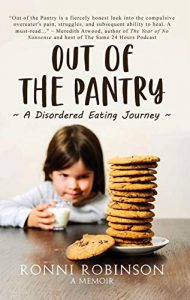Bared by the Writing: An Interview with Ronni Robinson
 Author and soon-to-be certified eating disorder recovery coach Ronni Robinson and I connected online over a year ago—about books, of course. Her debut memoir, Out of the Pantry: A Disordered Eating Journey, had been published in July 2020, and like many authors who debuted during the early months of the pandemic, she was looking for ways to increase visibility of the book. The more people who read, the better, and I eagerly picked up the book and recommended it for a Literary Mama May 2021 Now Reading segment. So when I heard that the book was coming out in audio, I jumped at the chance to interview Ronni because what struck me about her book was her courage. To write a gripping account of such a personal journey is inspiring, and not just to other authors. Readers are calling the book both “engaging and accessible,” and several reviewers shared the sentiment that a book like this—a brutally honest account of what living with an eating disorder can be like—would have been helpful long ago. In addition to the book, Ronni has shared her eating disorder journey and the recovery process in several essays, and she’s written about triathlons, parenting, and “parenting our parents” for several publications. She’s also a champion literary citizen who bolsters fellow authors as much as she can. While I haven’t met Ronni in real life, I’d be honored to do so, and I’m so grateful she found the time to answer my questions.
Author and soon-to-be certified eating disorder recovery coach Ronni Robinson and I connected online over a year ago—about books, of course. Her debut memoir, Out of the Pantry: A Disordered Eating Journey, had been published in July 2020, and like many authors who debuted during the early months of the pandemic, she was looking for ways to increase visibility of the book. The more people who read, the better, and I eagerly picked up the book and recommended it for a Literary Mama May 2021 Now Reading segment. So when I heard that the book was coming out in audio, I jumped at the chance to interview Ronni because what struck me about her book was her courage. To write a gripping account of such a personal journey is inspiring, and not just to other authors. Readers are calling the book both “engaging and accessible,” and several reviewers shared the sentiment that a book like this—a brutally honest account of what living with an eating disorder can be like—would have been helpful long ago. In addition to the book, Ronni has shared her eating disorder journey and the recovery process in several essays, and she’s written about triathlons, parenting, and “parenting our parents” for several publications. She’s also a champion literary citizen who bolsters fellow authors as much as she can. While I haven’t met Ronni in real life, I’d be honored to do so, and I’m so grateful she found the time to answer my questions.
Christina: Congrats on the two-year anniversary and audio release of Out of the Pantry. What have you learned over the past two years about the publishing industry and the writing life?
Ronni: Thank you! I’ve learned a lot. It turns out the writing life and the publishing world is not for the faint of heart. It’s tedious and arduous. Some writers figure out the formula, work with the right people for them, and can crank out books year after year and earn a living. Unfortunately, for most writers, that is not the case. As a first-time author, I had no idea that a book needed so much post-publication marketing and how overwhelming and time-consuming that marketing was. With all that being said, it has been amazing to hear from people how much my book has touched or helped them. That makes all the hard work worth it.
Christina: The book has been called “brave” and “honest and eye-opening.” Why did you choose to share your story? How difficult was it to bare yourself and put words on the page? What was your process?
Ronni: I vividly remember turning the finished manuscript over to my proofreader and feeling so emotional that I was basically at the finish line in this process. Then I had a moment: Oh my gosh, what have I done—I’m putting all my life’s dirty laundry out in the world for the public to read!!! But I quickly reminded myself that I wrote the book to pay my recovery forward. I knew how helpful similar books were for me when I struggled to recover. I wanted others to know they were not alone, help was out there, and they could recover from their eating disorder as well. It wasn’t easy at times to bare myself in my writing, but I learned even more about myself. My editor asked me questions that had me recall events I had forgotten about. While all of that was difficult on an emotional level, it was also enlightening.
Christina: One of your book club discussion questions asks, “Were you surprised that the author didn’t know for 30 years that she had an eating disorder? Why or why not?” For those of our readers who might not have read the book yet, can you give us a little background as to what all went into that lack of realization?
Ronni: The lack of awareness is because it wasn’t until after 2010 that binge eating disorder became an eating disorder diagnosis. Growing up, until I was 40 (in 2008), the public had only heard of anorexia and bulimia. I didn’t starve myself, nor did I purge. It never crossed my mind that I had an eating disorder or mental condition; I just thought I had a sweet tooth and considered myself a pig.
Christina: Eating disorders are for life. How are you now? Is this something you think about every day? Do you have any tips for anyone who is in the thick of the struggle right now?
Ronni: I’m doing great. While I probably have slightly different thoughts about food than “normal eaters,” I consider myself pretty ordinary. I have been recovered for over 14 years, though I realize that the disorder is probably just waiting for the right moment to strike. For anyone in the thick of the struggle, I would tell them to talk about it because we are only as sick as our secrets. Get counseling. Go to Overeaters Anonymous meetings where other eating-disordered people surround you, making you feel less isolated and more normalized. And of course, reading books (like mine, haha) helps to realize you are not alone and that your life doesn’t always have to be about food.
Christina: The book not only tackles the topic of eating disorders but also that of abusive relationships. Was it difficult not to get swallowed in the negativity and grief while you were writing? And how did you find the right balance so that readers didn’t get swallowed by the heavy themes?
Ronni: Thankfully, through therapy, we dissected, and I processed the abusive first marriage. There was no grief, only embarrassment that I let someone treat me like that. My editor was fantastic in helping me keep things from getting too heavy.
Christina: As far as abusive relationships go, what’s your number one tip for someone who might be in an abusive relationship? And how can someone on the outside help another person in that situation?
Ronni: My number one tip is – to get away from your abuser! The abuser isn’t going to harm you if you leave. He (it’s a “he” in most cases) is only threatening you to keep you from leaving him. Put a solid support system in place for yourself and move on with your life in a much healthier environment. An abuser can be very frightening but also very charming. They are great at manipulation. Someone on the outside can help by reassuring them that they won’t get hurt if they leave, change is scary but good, and most importantly, they are not to blame for the abuse. Also, there is nothing wrong with them, and they don’t deserve to be abused. The abuser is the one who has serious issues and needs help.
Christina: Let’s talk about your involvement in triathlons. How did you get started? What do you love about the sport? What have you learned about yourself with your involvement?
Ronni: I started with triathlon when I received an email about a fundraiser that supported helping to keep young girls from getting eating disorders. While I had been a runner for over a decade at that point, I never biked seriously and only knew how to swim enough to save myself, but that was about it. At that point, about two years into my recovery, I chose to step out of my comfort zone and train for this fundraising race. I have been an athlete my entire life, and attempting a triathlon was a great diversion and purpose to push my eating disorder further away and do something that was entirely for me. It was a form of self-care. I loved the structured training and being a competitive person; I loved the racing as well. It truly fulfilled me in body, mind, and spirit. Until then, my life was about taking care of my two kids, my husband, and the house. Triathlon was just for me, although it did make me a better wife and mom.
Christina: I love to ask authors about their pets, and it seems you have a cat. Can you tell us a little bit about them? And as an empty-nester, do you think you’ll fill the house with animals?
Ronni: My baby! I grew up with a cat but became allergic to them in my mid-30s. After three years of allergy shots, I decided to test myself last summer when my daughter and I chose to foster a cat. Happily, the shots worked, and I felt fine. He’s a sweet boy, now about 3-yrs old, that the rescuers named Casey. He had been attacked living outside and was the unfortunate recipient of feline AIDS from the attack. Needless to say, I fell in love with the cat, and it was a “foster fail.” My husband and kids know that the cat comes before any of them, LOL. I would love to get at least one more cat, so he has a friend, but my husband isn’t convinced. Yet.
Christina: What’s next for you?
Ronni: I’m getting educated, in all kinds of ways, to start my own Eating Disorder Recovery coaching business. As I said earlier, I feel very passionate about paying my recovery forward and helping those still struggling. I’m not anybody special, and I think that if I could recover after 30 years of abusing food, anyone can. I could relate to and empathize with my clients and do my best to help leave their eating disorders behind them.
Ronni can be found in multiple places!
Website: https://www.ronnirobinson.com/
Facebook: @RonniRobinsonwrites
Instagram: @ronnirobwrites
Twitter: @ronni3912
Thanks to Ronni for agreeing to this interview! If you know of an author who’d like to be featured in an interview (or you are an author who would like to be featured), feel free to leave a comment or email me via my contact page.

